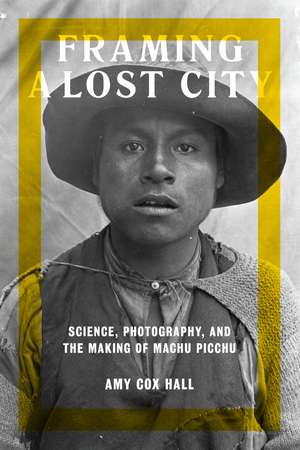Framing a Lost City: Science, Photography, and the Making of Machu Picchu
Autor Amy Cox Hallen Limba Engleză Hardback – 8 dec 2017
Preț: 534.67 lei
Preț vechi: 694.38 lei
-23% Nou
Puncte Express: 802
Preț estimativ în valută:
102.31€ • 107.09$ • 85.15£
102.31€ • 107.09$ • 85.15£
Carte tipărită la comandă
Livrare economică 31 martie-14 aprilie
Preluare comenzi: 021 569.72.76
Specificații
ISBN-13: 9781477313671
ISBN-10: 1477313672
Pagini: 288
Dimensiuni: 152 x 229 x 23 mm
Greutate: 0.59 kg
Editura: University of Texas Press
Colecția University of Texas Press
ISBN-10: 1477313672
Pagini: 288
Dimensiuni: 152 x 229 x 23 mm
Greutate: 0.59 kg
Editura: University of Texas Press
Colecția University of Texas Press
Notă biografică
Amy Cox Hall is a visiting assistant professor of anthropology at Amherst College and a research associate at the Five College Women’s Studies Research Center.
Cuprins
- List of Illustrations
- Acknowledgments
- A Note on the Text
- Introduction: Seeing Science
- Sight
- Chapter 1: Epistolary Science
- Chapter 2: Huaquero Vision
- Circulation
- Chapter 3: Latin America as Laboratory
- Chapter 4: Discovery Aesthetics
- Chapter 5: Picturing the Miserable Indian for Science
- Contests
- Chapter 6: The Politics of Seeing
- Conclusion: Artifact
- Notes
- Reference List
- Index
Recenzii
Hall's focus on expeditionary photography and her impressive juxtaposition and analysis of archival sources, including photographs, correspondence, photographic circulars, reports, newspapers, and magazines, make Framing a Lost City original and distinct...Framing a Lost City is a welcome and important contribution to the scholarship on photography, nation, and science in Latin America.
The detailed archival work that forms the basis of [Framing a Lost City] is exhaustive and admirable, and this archival complexity is narrated with great clarity. This alone makes Framing a Lost City a substantial contribution to the literature.
[Framing a Lost City] is a welcome addition to recent scholarship that pokes at imperfect understandings that have become orthodoxy…[Cox Hall] casts a critical eye on the nature of scholarship, discovery and science as it was practiced by US academics a century ago. [Cox Hall's] meticulous investigation of archival sources allows her to recreate the conditions of a grand project's genesis, execution, and conclusions.
[Framing a Lost City provides] valuable insights into some of the tensions between local, national and transnational actors that have shaped how [Machu Picchu] is portrayed and marketed today and the effects that this has had on the wider economic and cultural situation and self-definition of Cusco.
Engaging...Theoretically sophisticated, the book builds on the work of scholars such as Jorge Coronado and Deborah Poole that scrutinizes the way the Andes and its people have been imagined...Photographic images, the focus of Cox Hall’s well-researched work, played a significant role in shaping Machu Picchu as a lost city waiting to be found.
The value of Framing a Lost City lies in its examination of the creation of the brand that is Machu Picchu, and the persistence of that brand as a cultural icon... As Hall notes in the concluding chapter, Machu Picchu, through the lens of photography, remains the great lost city it never was.
Descriere
Drawing on science and technology studies, this book explores how photography transformed an Incan archaeological ruin into “Machu Picchu,” a world heritage site and crown jewel of Peruvian national patrimony.
